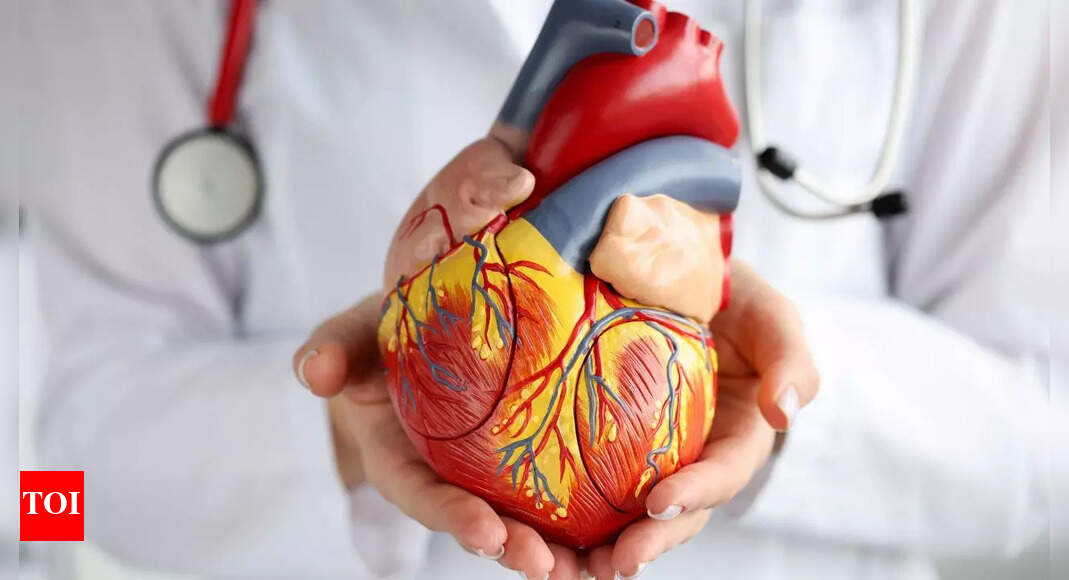What is Atrial Fibrillation? Understanding its heart rhythm disorder causes and symptoms to prevent complications | – Times of India

Atrial Fibrillation (AFib) is one of the most common forms of irregular heart rhythm disorders (arrhythmias). It originates in the atria, the upper chambers of the heart, and causes the heart to beat rapidly and chaotically. Instead of a steady and coordinated rhythm, the heart experiences multiple irregular electrical impulses, leading to poor blood pumping efficiency. This inefficiency can increase the risk of blood clots, stroke, heart failure, and other cardiovascular complications.Francis Ford Coppola, the legendary director of The Godfather trilogy and Apocalypse Now, underwent a scheduled cardiac procedure in Rome performed by renowned Italian-born cardiologist Dr Andrea Natale, his representative confirmed. The 86-year-old filmmaker is reportedly “resting nicely” and doing well following the update to a 30-year-old AFib procedure. While no further medical details were shared, Coppola reassured fans with a smiling Instagram photo, writing, “Da Dada (what my kids call me) is fine, taking an opportunity while in Rome to do the update of my 30-year-old AFib procedure with its inventor, a great Italian doctor – Andrea Natale.”While some people experience noticeable symptoms like heart palpitations, fatigue, and shortness of breath, others may remain completely asymptomatic, making it a silent yet dangerous condition. Understanding AFib’s causes, symptoms and risk factors is crucial to managing the condition.
Understanding Atrial Fibrillation (AFib)
In a normal heart rhythm, a single electrical signal moves in an orderly fashion through the atria and ventricles, prompting a consistent heartbeat. In atrial fibrillation, this process becomes disorganized:
- Electrical signals in the atria fire rapidly and chaotically.
- The atria fail to contract properly, causing ineffective blood flow to the ventricles.
- The ventricles respond by beating irregularly and often too quickly.
This irregular rhythm reduces the heart’s ability to pump blood efficiently, which can increase the risk of blood pooling in the atria. This pooling can lead to blood clot formation, raising the risk of stroke or other serious cardiovascular events.A simple analogy is to imagine an orchestra with multiple conductors giving conflicting instructions—the resulting performance (heartbeat) becomes disordered and unpredictable.
Key symptoms of Atrial Fibrillation
Symptoms vary widely among patients. Some may have intense symptoms, while others may not notice anything unusual. The most common signs include:
- Heart alpitations – a fluttering, racing, or pounding sensation in the chest
- Severe fatigue – a persistent feeling of exhaustion or weakness
- Shortness of breath (Dyspnea) – difficulty breathing, especially during activity or while lying down
- Dizziness or lightheadedness – a spinning sensation or feeling faint
- Fainting (Syncope) – temporary loss of consciousness in severe cases
- Chest pain (Angina) – which may indicate heart strain or an underlying heart condition
Even if AFib episodes are brief or infrequent, untreated AFib increases the risk of stroke, heart failure, and other complications. Anyone experiencing sudden chest pain, severe breathlessness, or fainting should seek emergency medical care immediately.

What causes AFib
AFib typically develops due to changes in the heart’s tissue or its electrical signaling system. Common causes include:
- Heart diseases – such as coronary artery disease, valve disorders, and heart failure
- Chronic health conditions – like high blood pressure, obesity, sleep apnea, diabetes, and hyperthyroidism
- Genetics – inherited changes in certain genes may predispose individuals to AFib, especially those who develop it at a younger age
- Heart surgery – AFib often occurs temporarily following heart or even non-cardiac surgeries due to stress on the heart’s electrical system
Major risk factors for AFib
While AFib can occur in anyone, certain factors raise the likelihood of developing it:
- Advanced age – risk increases significantly after age 65
- Excessive alcohol use – heavy or binge drinking significantly increases risk
- Severe illnesses – including sepsis, severe lung infections, or COVID-19 complications
- Sedentary lifestyle – physical inactivity is linked to cardiovascular weakness and arrhythmias
- Extreme endurance training – long-term intense exercise (3+ hours daily) can stress the heart, increasing AFib risk
Also Read | How a suspected flu led to a brain tumour diagnosis for a 26-year-old: Don’t ignore headaches, fatigue and other warning signs
var _mfq = window._mfq || [];
_mfq.push([“setVariable”, “toi_titan”, window.location.href]);
!(function(f, b, e, v, n, t, s) {
function loadFBEvents(isFBCampaignActive) {
if (!isFBCampaignActive) {
return;
}
(function(f, b, e, v, n, t, s) {
if (f.fbq) return;
n = f.fbq = function() {
n.callMethod ? n.callMethod(…arguments) : n.queue.push(arguments);
};
if (!f._fbq) f._fbq = n;
n.push = n;
n.loaded = !0;
n.version = ‘2.0’;
n.queue = [];
t = b.createElement(e);
t.async = !0;
t.defer = !0;
t.src = v;
s = b.getElementsByTagName(e)[0];
s.parentNode.insertBefore(t, s);
})(f, b, e, ‘https://connect.facebook.net/en_US/fbevents.js’, n, t, s);
fbq(‘init’, ‘593671331875494’);
fbq(‘track’, ‘PageView’);
};
function loadGtagEvents(isGoogleCampaignActive) {
if (!isGoogleCampaignActive) {
return;
}
var id = document.getElementById(‘toi-plus-google-campaign’);
if (id) {
return;
}
(function(f, b, e, v, n, t, s) {
t = b.createElement(e);
t.async = !0;
t.defer = !0;
t.src = v;
t.id = ‘toi-plus-google-campaign’;
s = b.getElementsByTagName(e)[0];
s.parentNode.insertBefore(t, s);
})(f, b, e, ‘https://www.googletagmanager.com/gtag/js?id=AW-877820074’, n, t, s);
};
function loadSurvicateJs(allowedSurvicateSections = []){
const section = window.location.pathname.split(‘/’)[1]
const isHomePageAllowed = window.location.pathname === ‘/’ && allowedSurvicateSections.includes(‘homepage’)
const ifAllowedOnAllPages = allowedSurvicateSections && allowedSurvicateSections.includes(‘all’);
if(allowedSurvicateSections.includes(section) || isHomePageAllowed || ifAllowedOnAllPages){
(function(w) {
function setAttributes() {
var prime_user_status = window.isPrime ? ‘paid’ : ‘free’ ;
var geoLocation = window?.geoinfo?.CountryCode ? window?.geoinfo?.CountryCode : ‘IN’ ;
w._sva.setVisitorTraits({
toi_user_subscription_status : prime_user_status,
toi_user_geolocation : geoLocation
});
}
if (w._sva && w._sva.setVisitorTraits) {
setAttributes();
} else {
w.addEventListener(“SurvicateReady”, setAttributes);
}
var s = document.createElement(‘script’);
s.src=”https://survey.survicate.com/workspaces/0be6ae9845d14a7c8ff08a7a00bd9b21/web_surveys.js”;
s.async = true;
var e = document.getElementsByTagName(‘script’)[0];
e.parentNode.insertBefore(s, e);
})(window);
}
}
window.TimesApps = window.TimesApps || {};
var TimesApps = window.TimesApps;
TimesApps.toiPlusEvents = function(config) {
var isConfigAvailable = “toiplus_site_settings” in f && “isFBCampaignActive” in f.toiplus_site_settings && “isGoogleCampaignActive” in f.toiplus_site_settings;
var isPrimeUser = window.isPrime;
var isPrimeUserLayout = window.isPrimeUserLayout;
if (isConfigAvailable && !isPrimeUser) {
loadGtagEvents(f.toiplus_site_settings.isGoogleCampaignActive);
loadFBEvents(f.toiplus_site_settings.isFBCampaignActive);
loadSurvicateJs(f.toiplus_site_settings.allowedSurvicateSections);
} else {
var JarvisUrl=”https://jarvis.indiatimes.com/v1/feeds/toi_plus/site_settings/643526e21443833f0c454615?db_env=published”;
window.getFromClient(JarvisUrl, function(config){
if (config) {
const allowedSectionSuricate = (isPrimeUserLayout) ? config?.allowedSurvicatePrimeSections : config?.allowedSurvicateSections
loadGtagEvents(config?.isGoogleCampaignActive);
loadFBEvents(config?.isFBCampaignActive);
loadSurvicateJs(allowedSectionSuricate);
}
})
}
};
})(
window,
document,
‘script’,
);
[title_words_as_hashtags




